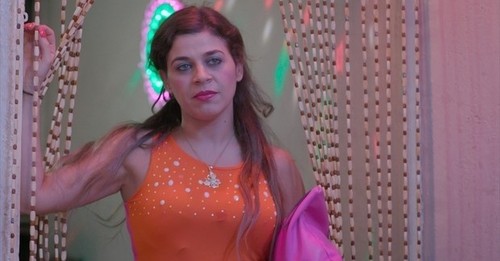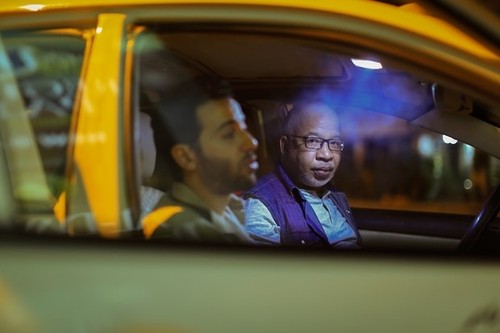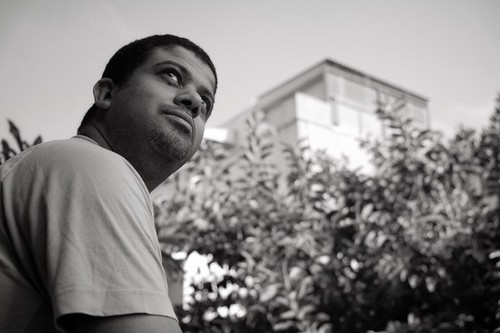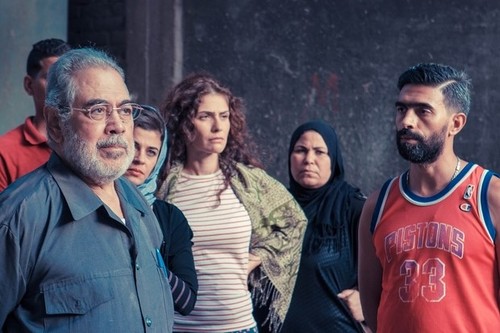CAIRO BY NIGHT: AHMAD ABDALLA'S LATEST FILM TAKES AUDIENCES TO THE DARK SIDE OF EGYPT
CAIRO BY NIGHT:
AHMAD ABDALLA'S LATEST FILM TAKES AUDIENCES
TO THE DARK SIDE OF EGYPT
In EXT. Night, Cairo is an oppressive dystopia where women are treated as sex objects, and the rich live in a sheltered bubble

Toutou, played by Mona Hala, is a headstrong prostitute who is self-aware and intelligent (Photo coutesy of Ahmad Abdalla)

Tuesday 11 September 2018 17:12 UTC
Last update:
Wednesday 12 September 2018 13:29 UTC
Källa
The last time Egyptian indie whizz Ahmad Abdalla had a film in theatres, four years ago, Tiran was an Egyptian island, the devaluation of the Egyptian pound that drove millions into poverty was a distant nightmare, and the crackdown on journalists and activists was not yet all pervasive.
Four years later, the view from Egypt has grown murkier and more foreboding. As cinema drifts further away from the reality of the Egyptian streets, Abdalla’s new film, EXT. Night – which premiered this week at the Toronto International Film Festival - is a hyper-realistic confection of blaring images, discordant noises, and flaring sentiments all laced into one narrative.
Set over the course of 24 hours, rising star Karim Kassem plays Moe, an ambitious filmmaker dipping his toes in the world of advertising after his first film flops at the box-office. But he is a fish out of water in the commercial world - unpragmatic, self-indulgent and spineless.

Karim Kassem and Sherief El Desouky in a scene from EXT. Night, which is set over the course of 24 hours (Photo coutesy of Ahmad Abdalla)
Nothing seems to be working out in Moe’s confined, sheltered existence. His girlfriend has just broken up with him and his writer friend, who is based on novelist Ahmed Naji, has been detained for publishing “a profanity-laden” novel.
Moe's life takes a turn for the unexpected when he is asked to pick up a prostitute from his nephew’s home during a routine ride with his driver Moustafa, who is played by Sherief El Desouky.
This leads him to Toutou, played by Mona Hala, a headstrong sex worker who is more self-aware and intelligent than both men. Together, the three embark on a journey in a downbeat Cairo where gender roles are constantly questioned, power dynamics between the classes are laid bare, and personal spaces are repeatedly violated.
In this largely nocturnal journey, Abdalla has produced the most accurate portrait of Cairo after the 30 June 2013 mass protests against Hosni Mubarak’s elected successor, Mohamed Morsi, who was overthrown by the military on 3 July that year.
Scripted by Sherif Alfy, Cairo is an oppressive cityscape where members of each class are forced to adhere to their tribe, women are continuously treated as sex objects, and the rich seclude themselves in a sheltered bubble in order to survive the ugly reality of a nation on life support.
Woman's voice
Abdalla’s primary interest in the film was rooted in a long-held desire to tell a story fronted by a woman.
“[A] few years ago, [renowned Egyptian filmmaker] Yousry Nasrallah said that Egyptian cinema fell into a slump when it stopped telling stories of women. I couldn’t agree more,” Abdalla told Middle East Eye. “Even though the main character of the film is a man, Toutou’s voice is the most dominant in the story.”
Of the various outstanding performances in the film, Hala steals the limelight with a ferocious, multi-layered turn as a woman compassionate yet defiant, and unabashedly desirous yet dignified.
Abdalla’s refusal to portray Toutou as a victim renders a refreshing, unsentimental treatment of sex work. Tipped to win accolades the world over, Hala’s complex and meaty role was in fact turned down by a major actor, whom Abdalla refuses to name, due to the controversial nature of the role.
More actors rejected the role of Toutou’s friend, played by Egyptian actor Basma, whom they assumed to be also a prostitute when in fact she is not. “I decided at the end to work with actors who care more for their art than their image on social media,” Abdalla said.
The rising segregation of Egyptian society was the other theme that sealed Abdalla’s involvement in the project.
“The current Egyptian society is designed in a way that prevents different communities from converging with one another,” Abdalla said. “Physically even, there are gigantic barriers separating high-end neighbourhoods from shantytowns, like Ard El Lewa and Mohandessin for instance. Any attempt to dismantle this model would automatically be thwarted. It has become a taboo.”
EXT. Night is arguably Abdalla’s most mainstream film to date: it is a colourful, emotionally accessible work laced with humour and pop culture tie-ins. The intellectual rigour of his previous work remains front and centre, yet none of the narrative experimentation that cemented Abdalla’s reputation as the most consistent independent filmmaker in the country can be traced in his new outing.
A household name
Abdalla became a household name in Arab cinema with his debut feature, Heliopolis (2009), a multi-character drama imbued with the emotional paralysis of Mubarak’s waning years.

Ahmad Abdalla has become a household name in Arab cinema (Photo courtesy of Joseph Fahim)
His sophomore effort, the spirited musical docudrama, Microphone , about Alexandria’s underground art scene, was released on the eve of 25 January 2011. Soon it became the movie of the revolution after Mubarak’s ousting, drawing large audiences before curfew hours.
His third feature, Rags and Tatters (2013), was a radical departure from his previous work - a wordless, impressionist portrait of the immediate aftermath of the revolution heralding the violence and uncertainty to come.
His last film, Décor(2014), was another significant change in direction. His biggest-budget film to date, this psychological drama about a woman torn between two men was overshadowed by controversial statements of its outspoken star Khaled Abol Naga, in which he claimed that the people might ask the then newly-elected President Abdel Fattah al-Sisi to leave office soon.
Released in September 2014, the film was a box-office flop, signalling the end of Abol Naga’s once robust film career in Egypt. Still, Abdalla denies that his comments had any impact on the commercial performance of the film.
In the following couple of years, Abdalla went on to develop an ambitious, expensive zombie comedy that hit the brakes after the Egyptian pound plunged against the dollar in November 2016. The suspension of the project propelled him to go in the opposite direction, returning to his roots by producing EXT. Night, a small-budget project shot in quick time.
Escaping Egypt
Abdalla was also director of photography for the film, shooting most of it in the bustling streets of Cairo. He used a small camera that allowed him to shoot incognito, avoiding the rowdy crowds who are usually very wary of cameras.
Abdalla cites the films of 80s neo-realist directors Mohammed Khan and Atef El Tayeb as an influence for capturing the grubby, unadorned vistas of a suffocating and congested city that is devoid of discernable beauty.
“You need plenty of permissions and extensive procedures to shoot in Cairo streets these days. You’d need to empty the streets out, use caravans for the actors, get big lighting equipment. That’s what happens in big productions,” Abdalla said.
“By the time the shooting starts, everything becomes palpably fake. At the same time, mainstream films are not concerned in the first place with presenting an authentic picture of Cairo or documenting the city. I, on the other hand, was adamant on having real Cairenes blended within the background of the film. That’s why I used natural light for instance.”

In EXT. Night, power dynamics are one of the central themes of the film (Photo coutesy of Ahmad Abdalla)
Abdalla’s Cairo is a place where personal space is non-existent, casually desecrated by every agent of society.
“Even though my three characters are out on the street most of the film, they develop their relationship with one another within the confines of this small cubicle that is the car. The sky is not the limit in a place like Cairo,” Abdalla said. “The sense of claustrophobia is not merely a reaction to their position inside this space – it’s an extension of their inner claustrophobia. Everyone is trapped in their own external and internal worlds - in their own fears.”
The tireless longing for escaping Egypt can be traced in most of Abdalla’s films, and EXT. Night is no different.
“Moe’s venturing into this alternative realm is not rooted in a courageous intent to discover and meet people different from him. It stems from an impulse to break away from his failures and disappointments and lose himself in a new place. This speaks for all of us in Egypt now, including me.”

According to Abdallah, EXT. Night explores 'the relationship of the authorities with the people, in the relationship of people to one another' (Photo coutesy of Ahmad Abdalla)
Scriptwriter Sherif Alfy was thrust into depicting every character’s attempt to impose authority on the others, with all but Toutou imposing their moral judgement too. The world Abdalla paints is bereft of choice. The little control each character vehemently fights for is negligible in the grander scheme of things.
Crossing the line
With the ban of Tamer El Said’s In the Last Days of the City, a snapshot of pre-2011 Cairo, and the way the 2011 revolution changed the capital, independent films have been an obvious target for censorship. Tarik Saleh’s Swedish production, The Nile Hilton Incident, a noir thriller about police corruption set on the eve of the 25 January revolution, was likewise banned for including negative references to the police and the army.
Since Sisi came to power in 2014, censorship of independent films has increased and any negative references to officialdom have been steadily prohibited.
Abdalla’s new film contains its fair share of contentious material, including, most notably, an extended sequence in a police station where Moe tells a young police officer that “the entire country is now in your cells”.
Abdalla stresses that he has not had any problems with censorship as the film was granted a licence without any cuts and will represent Egypt at the Cairo Film Festival in November. He acknowledges, however, that the fight with the authorities is far from over.
“The most important element of our battle is to persevere and make our own movies on our own terms in Egypt, instead of eloping abroad,” Abdalla commented.
Abdalla believes that only four or six films in the past four years have truly tapped into the current Egyptian reality.
Deconstructing Cairo
EXT. Night ends with a quote from the notorious novel of Ahmed Naji, The Use of Life, which handed the Egyptian writer a two-year prison sentence for containing sexually explicit material in 2016. He was later released on appeal after spending more than 300 days in prison.
In it, Naji describes the clashing emotions of living in an alienating city, offering a glimpse of hope in the possibility of reconciliation, or rather acceptance.
“In many ways, the novel acts as a deconstruction of Cairo, exploring how the city has changed beyond recognition. That’s what I also tried to illustrate in my film," Abdalla said.
